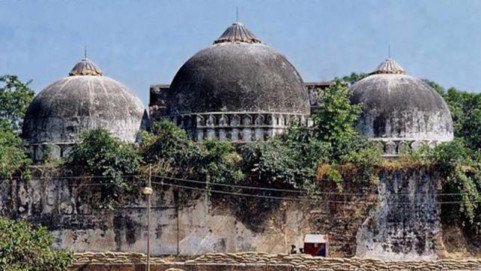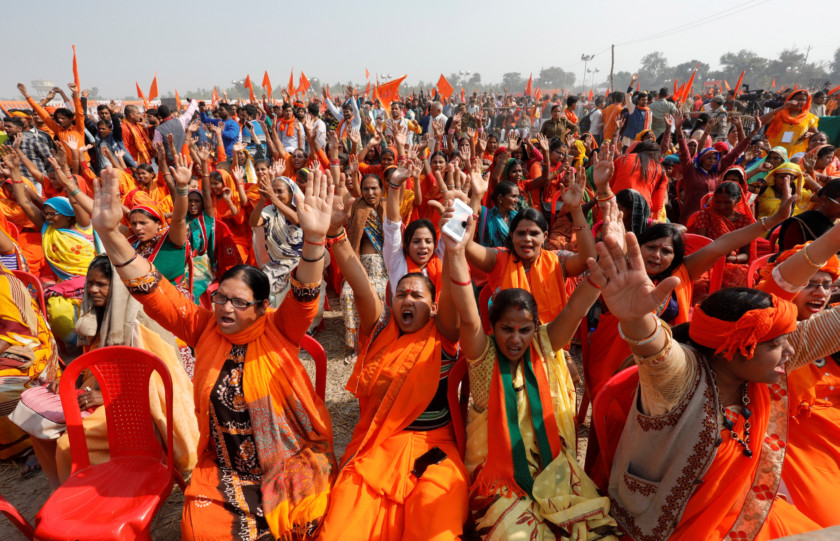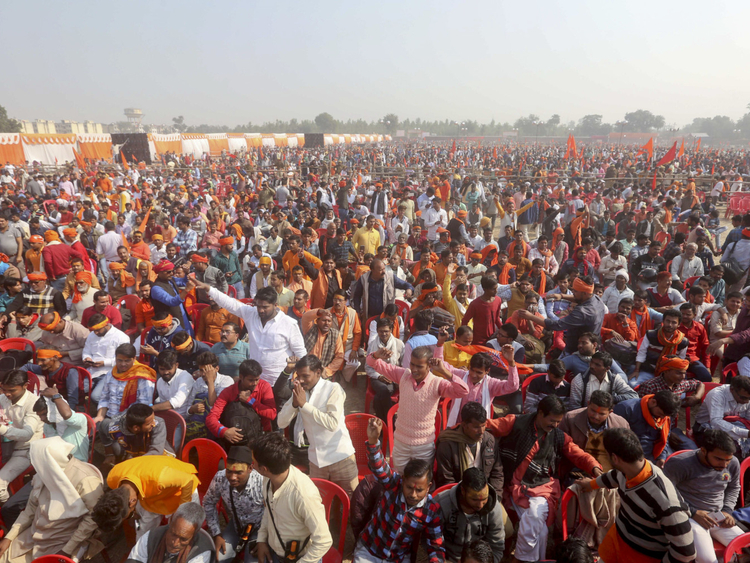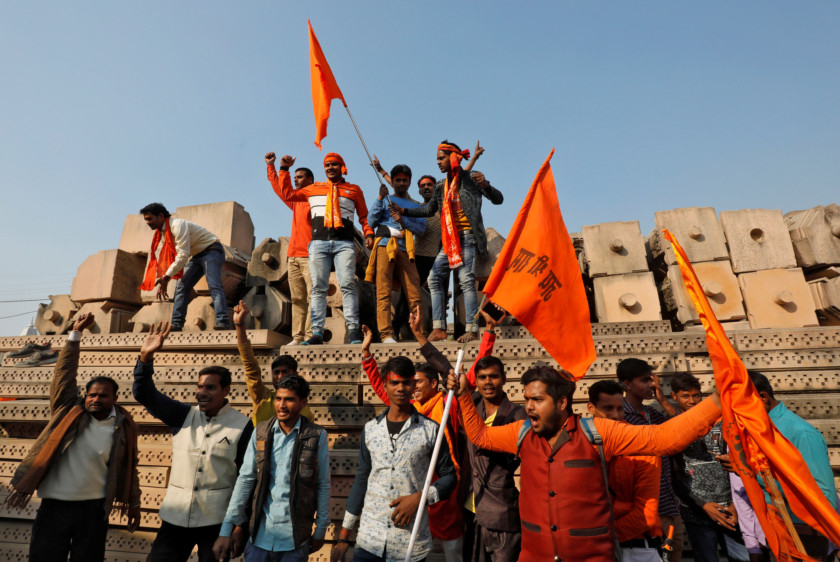
COMMENT
Days ahead of the 26th anniversary of Babri mosque demolition in 1992, the right-wing has mounted what appears to be a synchronised attack on India’s Supreme Court which is hearing the century-old Ayodhya dispute.

In the last two days, elements of the right-wing outfits, which fall under a family umbrella known as Sangh Parivar, have criticized the judges for their refusal to hear the case on a daily basis.
Refusing to hold daily hearings, the Supreme Court last month adjourned the case to January. A new bench will hear petitions challenging a lower court order that divided a disputed piece of land into three parts – Ram, a Hindu outfit and Muslims.
The Supreme Court is hearing a clutch of petitions challenging this order and the Sangh Parivar, including the ruling Bharatiya Janata Party, is demanding daily hearings and a verdict before the next parliamentary elections due early next year.
Hindu outfits claim lord Ram was born at the very spot where the Mughal era Babri mosque once stood and demand a temple on a 1.12-hectare plot of land which was acquired by the government after the mosque was razed by a Hindu mob in 1992.
The Supreme Court has to decide on the ownership of this piece of land in the dispute that has killed hundreds, if not thousands, since the country’s independence.
This week’s shrill attack on the judges is not surprising as the Sangh Parivar elements have routinely shown contempt for constitutional bodies, including the judiciary.
However, the scale of criticism this time is unprecedented as it comes from very senior leaders and elected lawmakers of the ruling BJP and its allies.
On Sunday, when tens of thousands of activists arrived in the northern town of Ayodhya for a Dharmasabha or a religious gathering, Sangh Parivar outfits competed with each other in raising the temple pitch.

“We brought down Babri in 17 minutes. Ram-bhakts (devotees) removed the blot that had been there for years, within minutes... toh kaagaz banane mein kitna waqt lagta hai (how much time does it take to draw up papers?) If you talk about an ordinance, then from the President’s House Rashtrapati Bhavan to Uttar Pradesh, it is BJP all the way. What else do you want?” said Sanjay Raut, a lawmaker from Shiv Sena, a BJP ally.
We brought down Babri in 17 minutes. Ram-bhakts (devotees) removed the blot that had been there for years, within minutes... toh kaagaz banane mein kitna waqt lagta hai (how much time does it take to draw up papers?) If you talk about an ordinance, then from the President’s House Rashtrapati Bhavan to Uttar Pradesh, it is BJP all the way. What else do you want?”
'Ignoring Hindu sentiments'
The same day, Mohan Bhagwat, chief of Rashtriya Swayamsevak Sangh or RSS, the parent body of Sangh Parivar, accused of the Supreme Court of ignoring “Hindu sentiments”.
He said: “It has become obvious that Ram temple is not a matter of priority for the Supreme Court. Hindus have always abided by the law and shown enough patience… can society run only on the basis of law? Can any question be raised against matters of faith? Will you continue to evade the truth and the feelings of people? Sometimes, such pressure can lend strength to the government.”
Joining the issue, Prime Minister Narendra Modi suggested the court delayed Ayodhya hearing after his rival Congress party pressurised the judges.
“If a Supreme Court judge does not prepare the time table [for hearing cases] as per their [Congress’s] political intentions and wants to hear all to deliver justice on a serious and sensitive issue, such as Ayodhya, then the party’s lawyers, who are Rajya Sabha members, start the game of scaring the judges in the name of impeachment,” Modi said during a public meeting in election-bound Rajasthan state.
Why this attack now?
There can be only one explanation for raising the Ayodhya pitch – elections are taking place in five states, including Rajasthan, Madhya Pradesh and Chattisgarh where the BJP is the ruling party and is fighting a tight race with the Congress.
Observers say the BJP has orchestrated this round of Ayodhya campaign after poll surveys indicated it will lose all the three states where the election results will be declared on December 11.
By mounting this attack on the judiciary, the BJP wants to shape public opinion in favour of the temple and project itself as the sole champion of Hindu religious nationalism.
By mounting this attack on the judiciary, the BJP wants to shape public opinion in favour of the temple and project itself as the sole champion of Hindu religious nationalism.
If the December 11 results go as predicted, the Modi government can even consider sidestepping the Supreme Court by bringing a legislation or ordnance by arguing: ‘Hey, we patiently waited for the court to settle the issue and now are forced to bring a law to build the temple.’
The BJP’s strategy to whip up religious sentiments is not new and the party’s electoral victories since the nineties have been attributed to cultural nationalism, an ideology to fall back upon when nothing works.
Modi came to power in 2014 promising jobs, economic growth and corruption free governance.
Most data indicate job creation slowed down during his four-and-a-half year rule — and his mishandling of demonetisation and tax reforms impacted the economy in a big way.
In the battle of perceptions, Modi also failed on the promise corruption-free governance after he was accused of “criminal misconduct” by the opposition in a defence deal with France.
Worries for Modi
The prime minister has been accused of favouring industrialist Anil Ambani, a label that is hard to take off given his public proximity to the rich corporates.
He is a fighting a growing perception that India’s high economic growth only benefitted industrialists who became richer under his rule.
Compounding Modi’s worries in the election year is rural distress, widespread anger among the farming community and unrest in the working class due to high fuel prices.
With a poor track record, Modi and his colleagues in the Sangh Parivar appear to believe that only one thing can keep the BJP in power – a heavy dose of cultural nationalism riding on the Ayodhya issue. In the coming months, expect this attack to become shriller and louder.











